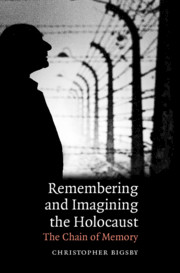Book contents
- Frontmatter
- Contents
- 1 The past remembered
- 2 W. G. Sebald: an act of restitution
- 3 Rolf Hochhuth: breaking the silence
- 4 Peter Weiss: the investigation
- 5 Arthur Miller: the rememberer
- 6 Anne Frank: everybody's heroine
- 7 Jean Améry: home and language
- 8 Primo Levi: from the darkness to the light
- 9 Elie Wiesel: to forget is to deny
- 10 Tadeusz Borowski: the world of stone
- 11 Memory theft
- Coda
- Notes
- Index
2 - W. G. Sebald: an act of restitution
Published online by Cambridge University Press: 22 September 2009
- Frontmatter
- Contents
- 1 The past remembered
- 2 W. G. Sebald: an act of restitution
- 3 Rolf Hochhuth: breaking the silence
- 4 Peter Weiss: the investigation
- 5 Arthur Miller: the rememberer
- 6 Anne Frank: everybody's heroine
- 7 Jean Améry: home and language
- 8 Primo Levi: from the darkness to the light
- 9 Elie Wiesel: to forget is to deny
- 10 Tadeusz Borowski: the world of stone
- 11 Memory theft
- Coda
- Notes
- Index
Summary
The moral backbone of literature is about the whole question of memory … Memory, even if you repress it, will come back at you and shape your life. Without memories there wouldn't be any writing.
W. G. Sebald, ‘The Last Word’Time past
Grows no more real
Through sufferings endured.
W. G. Sebald, After NatureOur world is a cracked bell that no longer sounds.
Goethe, quoted in The Emigrants…if I see before me
the nervature of past life
in one image, I always think
that this has something to do
with truth. Our brains, after all,
are always at work on some quivers
of self-organization.
After NatureW. G. Sebald disliked his first name, Winfried, both because it would have had to be on the approved list published by an edict of the Third Reich and because, in England, it was close to a girl's name, Winifred; he disliked his second because it had been his father's and he had a problematic relation to him. He was born in Wertach im Allgäu, a village three thousand feet up in the Bavarian Alps in 1944, the only son of Rosa, the daughter of a country policeman. His father, Georg, came from a family of glass makers and was himself a locksmith. There were three daughters.
The village, which had some one thousand inhabitants, was isolated. There was snow for five months of the year.
- Type
- Chapter
- Information
- Remembering and Imagining the HolocaustThe Chain of Memory, pp. 25 - 114Publisher: Cambridge University PressPrint publication year: 2006



